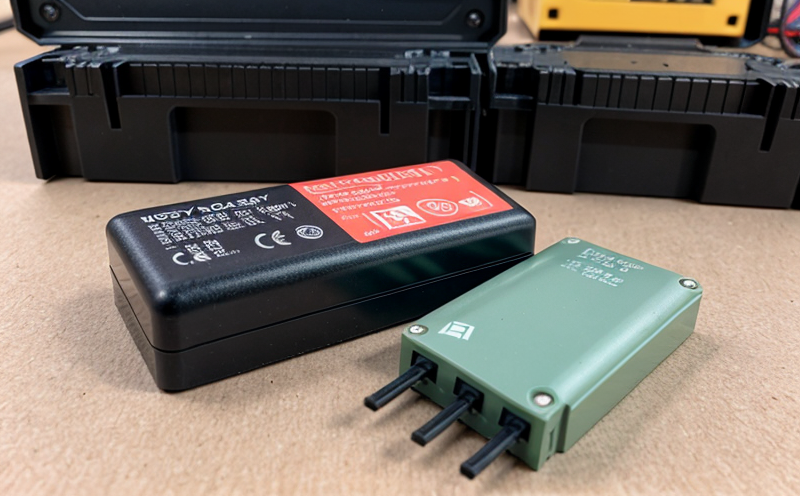JIS C8714 Lithium-Ion Module and Pack Performance Testing
The JIS C8714 standard is a critical benchmark for ensuring the safety, performance, and reliability of lithium-ion battery modules and packs in Japan. This testing service focuses on evaluating the electrical characteristics and mechanical integrity of these components to meet strict industry standards.
Our comprehensive suite of tests includes both single-cell and multi-cell module assessments using state-of-the-art equipment. Compliance with JIS C8714 is essential for manufacturers aiming to ensure their products are safe, efficient, and reliable in real-world applications. By adhering to this standard, companies can demonstrate compliance with international best practices and enhance market credibility.
Key aspects of our testing include:
- Evaluation of thermal stability
- Cell balancing performance assessment
- Cycling durability tests
- Short-circuit current measurement
- Over-temperature protection verification
- Internal resistance analysis
- Discharge capacity testing at different rates
The results from these tests provide detailed insights into the operational limits and performance characteristics of lithium-ion battery modules and packs. This information is invaluable for R&D teams looking to optimize product design, improve safety protocols, and enhance overall efficiency.
Our facility utilizes advanced measurement tools such as high-precision resistance meters, thermal imaging cameras, and automated discharge testers to ensure accurate and repeatable results. These instruments allow us to simulate real-world conditions under controlled laboratory settings, providing reliable data that can be used for certification purposes or internal quality control.
The importance of this testing cannot be overstated in the context of battery technology. As electric vehicles (EVs) become more prevalent, there is an increasing demand for safer and longer-lasting batteries. By adhering to JIS C8714 standards, manufacturers can mitigate risks associated with poor quality or unsafe designs.
Our team of experts ensures that every aspect of the testing process meets rigorous quality control measures. From specimen preparation to final analysis, we employ best practices to deliver accurate and actionable results. This dedication to precision is reflected in our commitment to continuous improvement and innovation within the industry.
Why It Matters
The significance of JIS C8714 compliance extends beyond mere certification; it represents a commitment to excellence in battery technology. The standard addresses critical safety concerns while promoting efficiency and reliability, which are paramount for both consumer electronics and automotive industries.
In the realm of electric vehicles, where performance and longevity are key factors influencing customer satisfaction, adherence to JIS C8714 helps manufacturers differentiate their offerings. It also fosters trust among consumers who value safety above all else when it comes to personal transport solutions.
For quality managers and compliance officers responsible for ensuring product integrity across supply chains, meeting these stringent requirements offers peace of mind knowing that they are upholding global standards of excellence. Moreover, R&D engineers benefit from having access to detailed performance metrics derived directly from JIS C8714 compliant tests.
The application of this standard ensures consistent quality throughout the manufacturing process, ultimately leading to safer products and increased customer confidence. In an era where technological advancements are rapid but must be balanced with robust safety measures, JIS C8714 plays a pivotal role in achieving this equilibrium.
Applied Standards
| Standard Reference | Description |
|---|---|
| JIS C8714:2010 | Pertains specifically to lithium-ion battery modules and packs, focusing on performance metrics including internal resistance, discharge capacity, and cycle life. |
| IEC 62660-2-3 | Covering safety requirements for portable sealed secondary batteries, which includes relevant aspects applicable to lithium-ion technology. |
| ASTM G174 | Addresses the determination of thermal stability by evaluating heat release rates under specific conditions. |
The combination of these standards ensures a holistic approach towards understanding and optimizing battery performance, addressing various dimensions from electrical characteristics to safety features. This multi-faceted approach guarantees that all critical parameters are thoroughly examined during testing.
Use Cases and Application Examples
- Electronic Devices: Ensuring extended battery life in laptops, smartphones, and other portable gadgets.
- Automotive Industry: Verification of safety features critical for passenger protection during accidents involving EVs.
- Solar Energy Storage Systems: Maximizing the efficiency of energy storage units to support renewable energy initiatives effectively.
- Medical Equipment: Providing reliable power supply essential for life-saving devices in hospitals and clinics.
The data obtained from JIS C8714 testing can be instrumental in various sectors, enhancing product performance while ensuring compliance with relevant regulations. This aligns perfectly with the broader goals of sustainable development and technological advancement across multiple industries.





